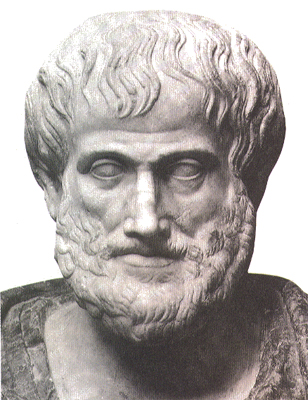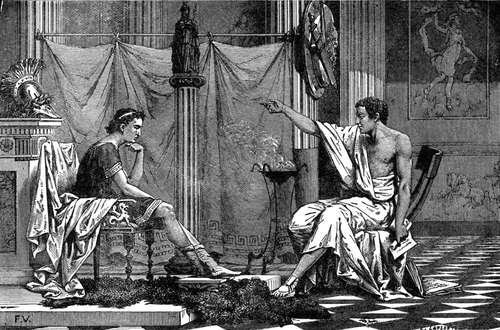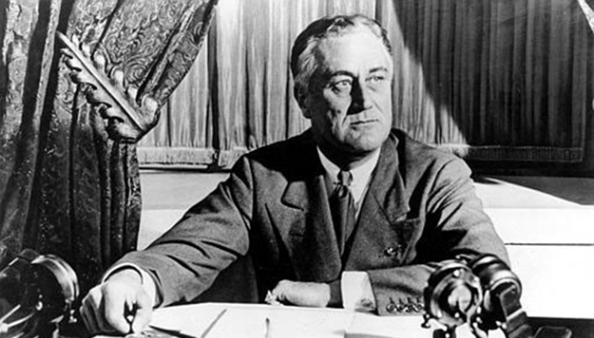

To: POTUS
From: Aristotle
Re: How you win
-----
Nice work last night.
You have 20 days left in this race. To win the election, you're going to have to trade your philosopher's toga for a warrior's sword. Last night proved you're willing to pick up your sword. I'm here to tell you how you take away Mitt Romney's.
Romney's most effective arguments always return to the same theme: you stand for government, he stands for freedom.
On every issue from jobs to health care, he's accused you of offering "a trickle-down government approach," which has "government thinking it can do a better job than free people pursuing their dreams." Freedom or government: this is the choice Romney wants voters to see, the frame that puts him in the White House.
You can take away this frame. In fact, you said something in the first debate that nobody noticed, but that just might win you the election.
At the 71-minute mark, when asked about the role of government, here's what you said:
As Abraham Lincoln understood, there are also some things we do better together. So, in the middle of the Civil War, Abraham Lincoln said, let's help to finance the transcontinental railroad, let's start the National Academy of Sciences, let's start land grant colleges, because we want to give these gateways of opportunity for all Americans, because if all Americans are getting opportunity, we're all going to be better off. That doesn't restrict people's freedom. That enhances it.
You may have meant those last lines more as a defensive riposte than a statement of principle. In the gloating and hand-wringing over your lackluster performance (sorry), this moment got little attention.
It may have been the most important two sentences of your campaign.
Last night, your closing argument invoked giving Americans a "fair shot," with "everyone playing by the same rules." An appeal to fairness wins you votes you already have; an appeal to freedom, like you started to do in the Lincoln answer, wins you voters from Romney and gives you four more years.
Believe me, your idea of freedom draws from a very ancient well. But in an age where Republicans have successfully identified freedom with low taxes and weak government, these words have a positively revolutionary ring: that government by the people and for the people is the instrument of liberty rather than its enemy; that our government can act to make us more free.
You tied this idea to policies Abraham Lincoln championed 150 years ago. He's not a bad ally to have in your corner. But to really understand this notion of freedom, and why it can win you votes right now, you need to go back further still.
Their "freedom" isn't the only freedom. Though Mitt Romney and Paul Ryan would never admit it, their idea of freedom is merely what philosophers like me call "negative freedom" -- freedom as the absence of restraint. This notion of individual freedom begins with early modern thinkers like Hobbes and Locke, and emerged in an age when despotic monarchies were still the norm. It is no accident, then, that this negative idea of freedom centers on the individual's right to be left alone by a naturally malevolent state. The Tea Party and libertarian objections to taxes, the social safety net, and corporate and environmental regulations are merely absolutist expressions of this same idea: less government always equals more freedom.
Freedom is the one idea that holds the modern Republican party together. It has the power to make irreconcilable policies cohere (e.g., 'The deficit is our biggest problem, but let's expand the defense budget and give massive tax breaks -- it's all about freedom'). It has the power to make small-town Christian conservatives think they have something in common with hedge-fund managers and Las Vegas tycoons.
Most importantly, the Republicans have turned freedom into an electoral battle-ax. Since Reagan first declared, "government is not the solution to our problem, government is the problem," you Democrats have had no good answer. When you say "fairness," like you did last night, they say, "No, freedom." When you say "equality," they say, "No, freedom." The same with "opportunity," "compassion," or "social justice": "freedom" is the trump card that, absent a Democratic candidate of extraordinary skill (the Clinton of '92, yourself in 2008), has delivered Republicans thirty years of national victories.
As long as Americans believe government is the natural enemy of freedom, Democrats will naturally lose. Deprive the Republicans of their monopoly on freedom, and you make their favorite political weapon your own.

The campaign team.
Your freedom is "positive freedom." The Republicans would have Americans believe that, absent the heavy hand of government, the uninsured single mom or unemployed high-school dropout enjoy just as much freedom as the millionaire sitting by his pool.
Democrats intuitively know that this isn't the whole story, that citizens driven bankrupt by health care costs, or hobbled by inadequate education, or breathing dirty air, are much, much less free to make something of their lives as a result.
This intuition has a name, and its time to use it: positive freedom.
The Obama brand of freedom is not "freedom from" but "freedom to" -- the freedom to live a self-directed life to the fullest limits of your potential. This was the freedom I first theorized 2300 years ago.
I explained it like this: Each of us human beings has a telos, the natural goal or end of our lives, that we reach through our own path toward reason and virtue. But because mankind is the politikon zöon ("political animal"), we can only realize our telos with the help of those around us. I called politics the architektonikês, or "master science," because the art of government is the art of building a society where everyone has a place and every individual can flourish.
In this kind of society, freedom wasn't defined by unrestrained license, but by "governing and being governed in turn." (Politics VI.i.6) "To live with a view to the political community," I concluded, "should not be supposed to be slavery, but preservation." And what did I argue would preserve this community? Universal public education (V.vii.20), and a strong middle class (IV.ix.8).
Americans should recognize what a gift self-government is. Free men and women serving on boards, debating great questions, fighting for causes, voting their conscience. These simple acts of democracy -- extremely uncommon in my day, still far too rare in yours -- give your citizens the chance to become just a bit wiser, more empowered, more willing to help the common good: in a word, more free. This isn't freedom you get handed by government, this is freedom you earn by governing yourselves.
In your evocation of Lincoln, you made yourself -- briefly, promisingly -- the spokesman for this positive concept of freedom. But don't do it just for me.
Positive freedom will win votes. Americans don't elect the better candidate: they elect the better story. The idea of freedom is fundamental to the your nation's story -- freedom from British rule, the freedom of the frontier, freedom's triumph over fascism and communism -- yet only one of the two major parties has explained how their ideas will make Americans more free. In short, freedom is the most critical political terrain, and for the last 30 years, only Republicans have been playing on it.
If you want to beat Romney, you need to explain how the side of government and the side of individual freedom are really the same side.
You have already taken firm stands for reproductive freedom and the freedom to marry. This is a good start, but this election is going to be won or lost on the economy, and it is on the economy that Romney's "government vs. freedom" choice is most devastating.
So why do Democrats fight for the social safety net, and student loans, and environmental protection, and Medicare? Because these investments are investments in people. Because you believe that freedom is not the absence of restraint, but the presence of opportunity. And that's the kind of freedom that will reinvent America's economy.
Your main argument so far has been a pragmatic one: "there are some things we just do better together." Politically speaking, this argument is -- and pardon me saying so -- a loser. Why? I know you're a practical guy, but arguments from practicality force you to cite facts and figures, and facts and figures put voters to sleep. When Romney makes a clear, principled appeal to freedom, you should -- you must -- do the same.
Say,
Governor Romney would cut public education, undo consumer protections, and shackle us to new foreign wars -- these are the ideas that make Americans less free as individuals and as a nation. I will invest in job training, in infrastructure, in higher education, and guarantee the rights of women and same-sex couples -- these are the ways Americans live more fulfilled, self-directed lives. This is what makes us more free.
There's no evil state ruling us from above: there's only us, ruling ourselves. This is the freedom Americans fought and died for, the sacred task to which we all give, and in which we all benefit.
This is what you believe. Time to say it out loud.
Positive freedom isn't just Greek, it's American. Finally, explain how your kind of freedom has been part of the American story. The religious freedom that the Puritans sought, the freedom that attracted wave after wave of immigrants, the freedom that slaves and suffragettes and workers yearned for -- this wasn't freedom from our government, this was freedom guaranteed by our government.
Even the Bill of Rights -- protections beloved by conservatives and liberals alike -- was not an attack on all government (remember the target: "Congress shall make no law..."), but rather a set of guarantees written into our system of government itself.
If the federal government had just stayed out of the way as Mitt Romney wants it to do, children would still be working in coal mines, our elderly would still be living in poverty, and whole communities of Americans would still be second-class citizens. Government can work better, it must always be reformed and reinvented, but it stands ultimately on the side of our freedom, not against it.

A president who ran on freedom.
You seem to have a thing for Lincoln, but let me leave you with the words of Franklin Roosevelt, spoken in the heart of Great Depression at Jefferson's Monticello:
Democracy needs now, as it found then, men developed, through education, to the limit of their capacity for ultimate responsibility. Emergencies and decisions in our individual and community and national lives are the stuff out of which national character is made.
Was the spirit of such men as Jefferson the spirit of a Golden Age gone now, and never to be repeated in our history? Was the feeling of fundamental freedom which lighted the fire of their ability a miracle we shall never see again?
That is not my belief. It is not beyond our power to re-light that sacred fire. There are no limitations upon the Nation's capacity to obtain and maintain true freedom, no limitations except the strength of our Nation's desire and determination.
In times of crisis, a positive vision of freedom is invaluable. You have 20 more days. Make it your own.
---
(Further reading for "Citizen's Book Club" fans: The distinction between "negative" and "positive" freedom was brilliantly explained by the Oxford philosopher Isaiah Berlin in his 1958 essay "Two Concepts of Freedom." Book V of Aristotle's Politics can be found here.)